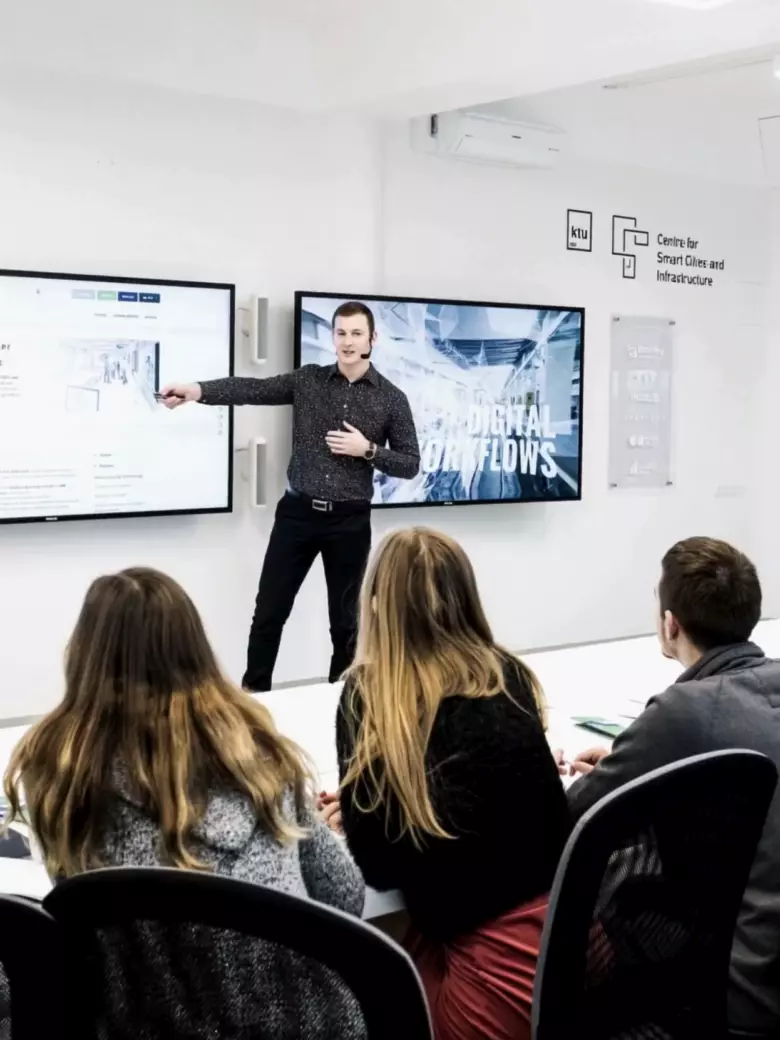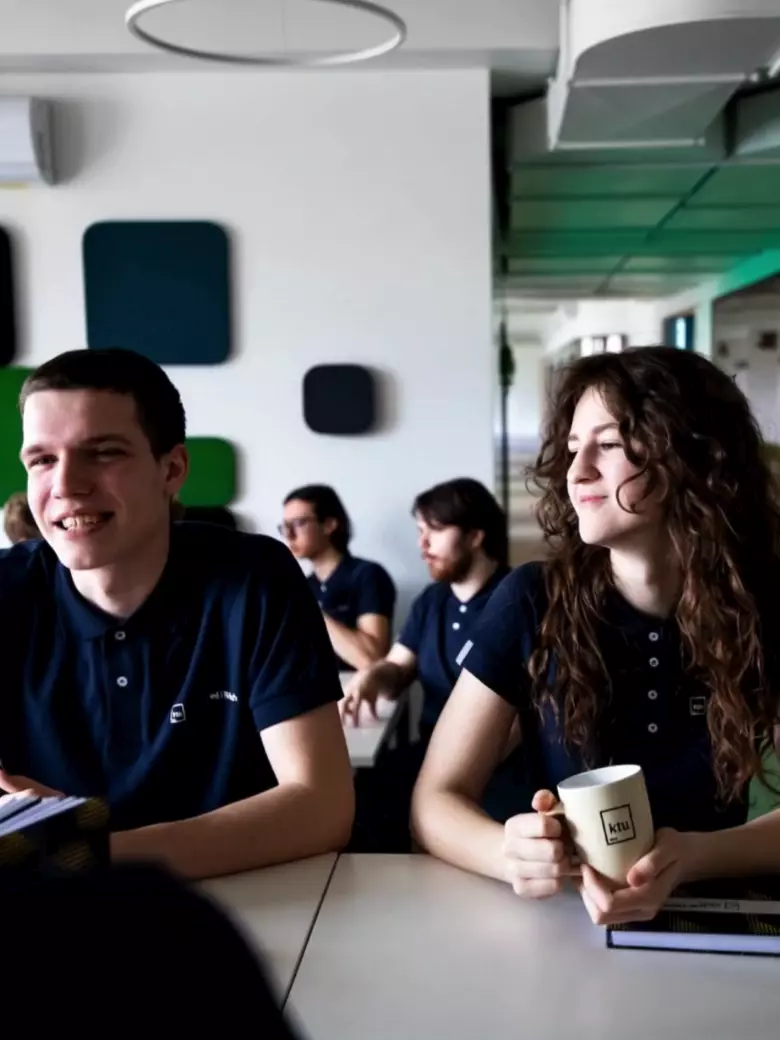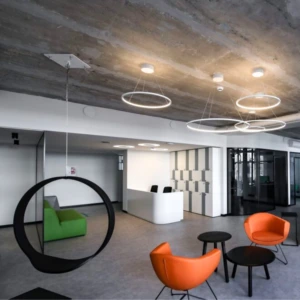The programme is only conducted in Lithuanian language. Entry requirements for this particular programme can be found in the programme description provided in Lithuanian language.
in Lithuanian
The power of data at your fingertips
We live in a world where every piece of data can have enormous value. This programme combines data science and engineering, giving you the opportunity to learn how to analyse, process and apply data to a wide range of problems. You’ll gain a background in data analysis and learn how to use cutting-edge tools to build artificial intelligence systems and predict market trends. Graduating from this programme will open up many opportunities to work with data analytics and there is a huge demand for these professionals today.

You will gain knowledge in data analysis, engineering and artificial intelligence, which is highly valued in international technology companies and academia.

Contemporary laboratories, international opportunities and a dynamic community provide inspiration and support to achieve ambitious personal and professional goals.

Hands-on projects and collaboration with companies will allow you to develop innovative solutions and gain the unique experience needed in the data ecosystem today.

You can choose specialised modules to develop specific skills and focus on areas of data science and engineering that interest you.
A Bachelor’s degree in Data Science and Engineering opens up a wide range of career opportunities working with big data, analysing it and developing solutions based on the insights it provides. You’ll be able to contribute to technological advances in sectors as diverse as finance, healthcare and industry.
Here are some of the careers you can pursue after your studies:
Collects, processes and analyses data to discover relevant business insights and make informed decisions.
Designs and develops systems that process and analyse data and ensure their efficiency and performance.
Develops and applies algorithms to automate processes and improve decision-making systems in various industries.
| Module name | Credits | Method of organisation |
|---|
| Discrete Mathematics | 6 | On-campus learning |
| Geometry | 6 | On-campus learning |
| Introduction to Mathematics and Informatics Studies | 6 | On-campus learning |
| Introduction to Object-Oriented Programming | 6 | On-campus learning |
| Mathematical Analysis 1 | 6 | On-campus learning |
| Module name | Credits | Method of organisation |
|---|
| Linear Algebra | 6 | On-campus learning |
| Mathematical Analysis 2 | 6 | On-campus learning |
| Programming for Data Processing and Visualization | 6 | On-campus learning |
| Media Philosophy | 6 | Blended learning |
| Sustainable Development | 6 | On-campus learning |
| Fundamentals of Object-Oriented Programming 2 | 6 | On-campus learning |
| Object-Oriented Programming 2 | 6 | On-campus learning |
| Module name | Credits | Method of organisation |
|---|
| Mathematical Analysis 3 | 6 | On-campus learning |
| Mathematics Software | 6 | On-campus learning |
| Physics 1 | 6 | On-campus learning |
| Theory of Probability | 6 | On-campus learning |
| Academic and Technical Communication in English (Level C1) | 6 | On-campus learning |
| Academic and Technical Communication in French (Level C1) | 6 | On-campus learning |
| Academic and Technical Communication in German (Level C1) | 6 | On-campus learning |
| Module name | Credits | Method of organisation |
|---|
| Cryptology | 6 | On-campus learning |
| Databases | 6 | On-campus learning |
| Mathematical Statistics | 6 | On-campus learning |
| Optimization Methods | 6 | On-campus learning |
| Business Process Digitalization | 6 | On-campus learning |
| Business Process Management and Modernization | 6 | On-campus learning |
| Teamwork in Information Systems Projects | 6 | On-campus learning |
| Module name | Credits | Method of organisation |
|---|
| Data Analysis | 6 | On-campus learning |
| Fundamentals of Information Systems | 6 | On-campus learning |
| Machine Learning Methods | 6 | On-campus learning |
| Methods of Mathematical Modelling | 6 | On-campus learning |
| Algorithms and Parallel Computing | 6 | On-campus learning |
| Business Intelligence and Data Mining | 6 | On-campus learning |
| Module name | Credits | Method of organisation |
|---|
| Applied Multivariate Analysis | 6 | On-campus learning |
| Deep Learning | 6 | On-campus learning |
| Product Development Project | 12 | On-campus learning |
| Business Process Digitalization | 6 | On-campus learning |
| Business Process Management and Modernization | 6 | On-campus learning |
| Design and Analysis of Computer Algorithms | 6 | On-campus learning |
| Teamwork in Information Systems Projects | 6 | On-campus learning |
| Module name | Credits | Method of organisation |
|---|
| Artificial Intelligence Solutions Development | 6 | On-campus learning |
| Bayes Methods and Uncertainty Analysis | 6 | Blended learning |
| Information System Design and CASE Technology | 6 | On-campus learning |
| Stochastic Processes | 6 | On-campus learning |
| Optional Subjects 2026 | 6 |
| Module name | Credits | Method of organisation |
|---|
| Bachelor’s Degree Final Project | 15 | On-campus learning |
| Professional Internship | 15 | On-campus learning |
The programme is only conducted in Lithuanian language. Entry requirements for this particular programme can be found in the programme description provided in Lithuanian language.
in Lithuanian

The Data Science and Engineering programme is all about analysing data, processing it and extracting valuable insights. At KTU, I gained practical skills to work with real data and develop artificial intelligence (AI) solutions. Analytical science is usually more expensive than technical knowledge, which is why professionals in this field are in high demand today.

Data science tools and techniques are versatile, so the knowledge gained can be applied to almost any field. This study programme gives you a strong start and the freedom to choose where and how you want to grow. Studying at KTU has given me a solid foundation for my current professional career. The most memorable thing was the variety of study modules and their applicability in practice. My studies in complementary pedagogy also contributed to my success.
Yes, the demand for data science professionals is growing both in Lithuania and internationally. Companies in sectors ranging from finance and healthcare to logistics and technology are actively looking for professionals who can work with big data, create predictive models and generate added value from data.
The Data Science and Engineering degree gives you the knowledge and skills to collect, analyse, process and visualise large data sets. You will learn machine learning algorithms, artificial intelligence applications, cloud computing solutions, database management, programming and data visualisation techniques and applications. You will also develop critical thinking, problem solving and project management skills.

Talk to us, study with us:
K. Donelaičio St. 73, LT-44249 Kaunas
phone +370 679 44 555
email studijos@ktu.lt
Faculty of Mathematics and Natural Sciences
XI Chamber
Studentų St. 50, LT-51368 Kaunas
email mgmf@ktu.lt
 virtual tour
virtual tour 
Student Info Center
Student Info Center
Studentų St. 50, LT-51368 Kaunas
email international@ktu.lt
Faculty of Mathematics and Natural Sciences
XI Chamber
Studentų St. 50, LT-51368 Kaunas
email mgmf@ktu.lt
 virtual tour
virtual tour